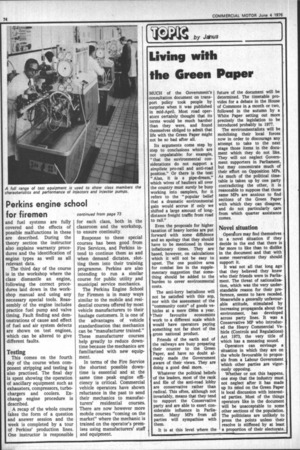Living with the Green Paper
Page 76

If you've noticed an error in this article please click here to report it so we can fix it.
MUCH of the Government's consultation document on transport policy took people by surprise when it was published in mid-April. Most road operators certainly thought that its terms would be much harsher than they were, and found themselves obliged to admit that life with the Green Paper might not be so bad after all.
Its arguments come step by step to conclusions which are not unpalatable: for example, "that the environmental considerations do not support a simpliste pro-rail and anti-road position." Or there is the text " Alas, it is a pipe-dream," which wives of hauliers all over the country must surely be busy working into samplers, for it refers to the "popular belief that a dramatic environmental gain would accrue if only we shifted a large amount of longdistance freight traffic from road to rail."
Even the proposals for higher taxation of heavy lorries are put forward with some diffidence and an apology that they should have to be mentioned in these inflationary times. They are based, however, on calculations which it will not be easy to upset. The one positive area for combat lies in the supplementary suggestion that something should be added to the burden to cover environmental costs.
The anti-lorry battalions will not be satisfied with this sop, nor with the assessment of the "community costs" of goods vehicles at a mere £98m a year. Their favourite economists work to a different scale which would have operators paying something not far short of the gross national product.
Friends of the earth and of the railways are busy preparing their counter to the Green Paper, and have no doubt already made the Government aware of their views. They are doing a good deal more.
Whatever the political beliefs of the leaders, most of the rank and file of the anti-road lobby are conservative rather than radical. This often, although not invariably, means that they tend to support the Conservative party and are able to exert considerable influence in Parliament. Many MPs from all parties will sympathise with them.
It is at this level where the
future of the document will be determined. The timetable provides for a debate in the House of Commons in A month or two, followed in the autumn by a White Paper setting out more precisely the legislation to be introduced probably in 1977.
The environmentalists will be mobilising their local forces now in order to discourage any attempt to take to the next stage those items in the document which they do not like. They will not neglect Government supporters in Parliament, but may concentrate much of their effort on Opposition MPs. As much of the political timetable is taken up by one party contradicting the other, it is reasonable to suppose that those same MPs are anxious to find sections of the Green Paper with which they can disagree, and do not particularly care from which quarter assistance comes.
Novel situation
Operators may find themselves in a novel situation if they decide in the end that there is far more to like than to dislike in the document and that with some reservations they should support it.
It was not all that long ago that they believed they knew who their friends were in Parliament. The threat of nationalisation, which was the very understandable reason for their preference, seems to have receded. Meanwhile a generally unfavourable attitude, stimulated by increasing propaganda about the environment, has developed across party lines. It was a Conservative MP who introduced the Heavy Commercial Vehicle (Controls and Regulations) Act 1973, the very title of which has a menacing sound.
Operators can envisage a situation in which they are on the whole favourable to proposals from a Labour Government which other parties are vigorously opposing.
Whether or not this happens, one step that the industry must not neglect after it has made up its mind on the Green Paper is local discussion with interested parties. Most of the things operators like in the document will be unacceptable to some ' other sections of the population. The politicians are unlikely to press the points unless their resolve is stiffened by at least a proportion of their electorate.




























































































































